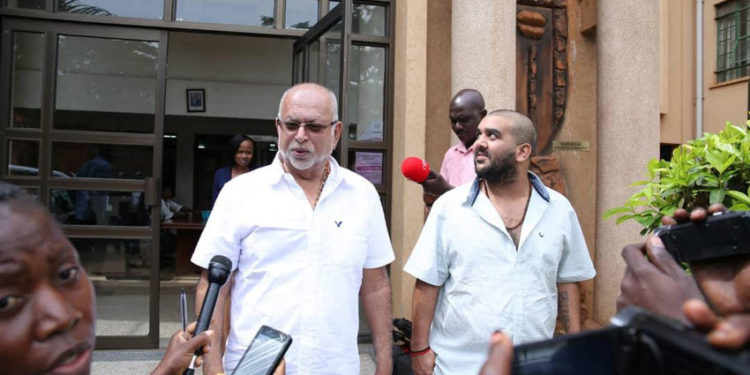Ruparelia Group of Companies has joined a host of firms seeking license to grow and export marijuana, media reports show.
It is worth noting that foreign and private companies are competing to grow the lucrative crop in Uganda, even before the authorities in government complete consultations on the medical and financial benefits of cannabis.
Premier Hemp of property mogul Sudhir Ruparelia is one of the companies that have already applied for a license to grow marijuana for medical purposes.
Premier Hemp is said to be one of the sponsors of new rally ace, Rajiv Ruparelia, Sudhir’s son.
During MOSAC Rally- the last event on the National Rally Championship that took place over the weekend in Kapeeka, Luweero district, Rajiv’s car was seen inscribed with a host of sponsors including ‘Premier Hemp’.
In an interview with this website, Rajiv confirmed that they have indeed applied for license to grow marijuana.
They have also secured land where the crop will be grown.
The Narcotic Drugs and Psychotropic Substances Act 2015 that was passed by Parliament, has triggered a gold rush among prospective local and foreign marijuana entrepreneurs, who are keen to invest in the medical marijuana industry.
Even when the authorities are still grappling with the idea of how to regulate the growing of medical marijuana, Daily Monitor recently reported that the number of people and private companies seeking to grow and export weed for medical purposes has increased from 20 in April to 50 in July 2019.
The government is also under pressure from the various marijuana dealers to explain why they allowed Industrial Hemp (U) Ltd, a private company working with another Israeli-based cannabis firm to grow marijuana in Kasese and “frustrated” others through “delaying tactics”. The company was given the license in 2016.
The company is also in the process of exporting marijuana, Cannabinol (CBD) and Tetrahydrocannabinol (THC) with mixture of 2.7mg THC and 2.5mg CBD for Sativex drugs approved in USA, Europe and Canada. Oil Risin contain Dronabinol for making Marinol and syndros capsules and CBD enriched creams for various skin disorders.
Health minister Jane Ruth Aceng has for months been ambivalent on how to proceed on a matter.
However, in one of the letters to marijuana firms applying to grow and process cannabis for medical purposes in Uganda, Dr Aceng wrote: “The government of Uganda through the Ministry of Health is still in early stages of carrying out wide consultations on this nascent area to understand the economic benefits of cannabis, its medical value based on scientifically proven evidence including the challenges of regulation so that we can formulate a way forward.”
She added: “In line with the above, we have not yet progressed to the stage of granting operational permits for entities to grow and process cannabis for medical export in Uganda. However, we welcome more information and input on the subject matter.”
What is medical marijuana?
The term medical marijuana refers to using the whole, unprocessed marijuana plant or its basic extracts to treat symptoms of illness and other conditions.
According to World Health Organisation, several studies have demonstrated the therapeutic effects of cannabinoids for nausea and vomiting in the advanced stages of illnesses such as cancer and Aids.
For instance, dronabinol (tetrahydrocannabinol) has been available by prescription for more than a decade in the USA
Other therapeutic uses of cannabinoids are being demonstrated by controlled studies, including treatment of asthma and glaucoma, as an antidepressant, appetite stimulant, anticonvulsant and anti-spasmodic.
The US Food and Drug Administration (FDA) has not recognised or approved the marijuana plant as medicine even though scientific study of the chemicals in marijuana, called cannabinoids, has led to two FDA-approved medications that contain cannabinoid chemicals in pill form.











